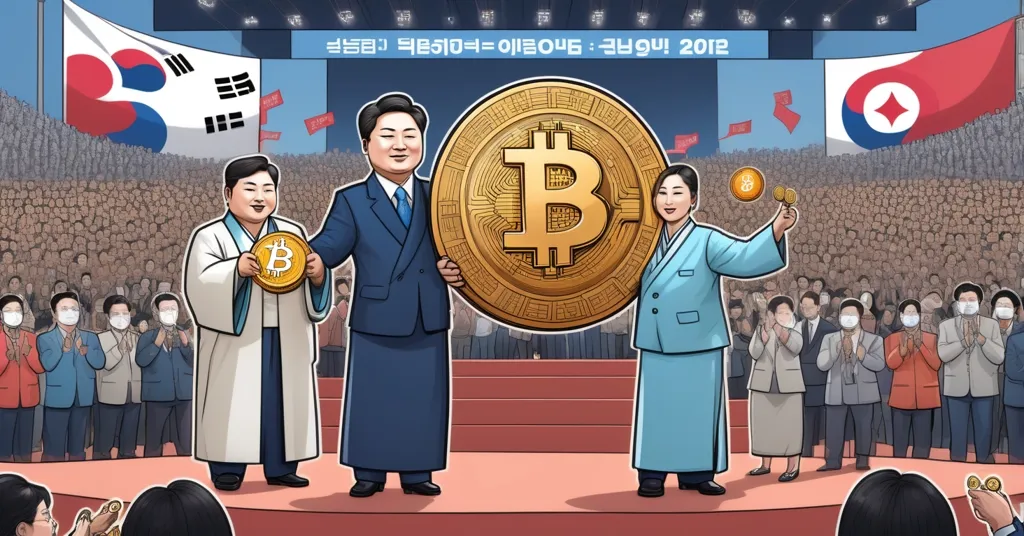South Korea’s Presidential Candidates Target 36% Crypto Voter Base

South Korea’s Presidential Hopefuls Woo Crypto Enthusiasts as Election Nears
With South Korea’s presidential election on June 3 fast approaching, the country’s 16 million cryptocurrency investors, representing 36% of the voting population, are a crucial demographic being courted by political parties. This significant group, fueled by Bitcoin’s market cap surpassing the KOSPI, is at the center of a political strategy aimed at shaping the future of digital assets in the nation.
- 36% of South Korea’s voters are crypto investors.
- Bitcoin’s market cap rivals the KOSPI.
- Democratic Party’s crypto policy includes a stablecoin system.
- People Power Party aims to make South Korea a global crypto hub.
- New regulations to allow virtual asset sales with anti-money laundering measures.
The surge in Bitcoin’s value, now exceeding 2,600 trillion won, rivals the combined worth of all companies listed on the Korea Composite Stock Price Index (KOSPI). This economic phenomenon has captured the attention of politicians from both major parties, the Democratic Party and the People Power Party, who see the burgeoning crypto market as both an opportunity and a challenge.
The Democratic Party has tapped Professor Kim Yong-jin, a token securities expert from Sogang University, to spearhead their crypto policy. They’ve introduced the draft Basic Digital Asset Act, which includes a stablecoin authorization system linked to legal tender. For those unfamiliar, a stablecoin is a type of cryptocurrency designed to maintain a stable value, often pegged to a currency like the won. This move underscores the party’s commitment to providing a structured regulatory framework for digital assets.
Meanwhile, the People Power Party isn’t sitting on the sidelines. They’ve outlined seven major crypto-related initiatives, including abolishing the one-exchange-one-bank system—a regulatory structure where each cryptocurrency exchange must partner with a single bank for transaction processing—and institutionalizing virtual asset trading for corporations. They’re also pushing to allow spot ETF trading within the year, where an exchange-traded fund tracks the price of a cryptocurrency in real-time. Their ultimate goal? To position South Korea as a global virtual asset hub. It’s clear these folks are dreaming big, but let’s hope they don’t wake up to find their dreams have become regulatory nightmares.
Kim Moon-soo, a candidate from the People Power Party, has been vocal about the need for better protection for virtual asset investors. He stated,
“About 16 million people, or one-third of the population, are participating in the virtual asset market, but virtual asset investors are being left without even the minimum protection measures.”
His comments spotlight the urgency of addressing the needs of this vital voting bloc. It’s a reminder that while the allure of crypto is strong, the reality of investor protection is a pressing issue that can’t be ignored.
In a move to further integrate crypto into the financial ecosystem, the Financial Services Commission has announced new regulations set to take effect in June. These rules will permit non-profit organizations and virtual asset exchanges to sell their virtual assets, provided they implement internal review mechanisms and strengthen anti-money laundering protocols. For context, anti-money laundering refers to a set of procedures, laws, or regulations designed to stop the practice of generating income through illegal actions. This regulatory shift indicates a move towards more structured participation in the crypto market, aligning with global trends towards regulating digital assets while ensuring security and compliance.
The high stakes of the crypto market in South Korea are evident in its daily trading volumes, which have surpassed those of the nation’s stock markets. This level of activity, driven in part by global events like the U.S. presidential election and the approval of spot crypto ETFs in the U.S. and Hong Kong, underscores the speculative nature of the market. While this presents opportunities for growth, it also raises concerns about the economic value of such trading, as noted by Kim Byoung-hwan, Chairperson of the Financial Services Commission. It’s a reminder that while crypto can be a goldmine, it can also be a minefield.
The political dynamics surrounding the crypto market are further complicated by the unity of crypto investors across traditional political divides. Both the Democratic Party’s presidential candidate Lee Jae-myung and the People Power Party’s Kim Moon-soo have recognized this, with Lee pledging to enact laws to accelerate the development of South Korea’s crypto market. This unity across the political spectrum is a testament to the power of crypto to bring people together, even if it’s just to argue over the best blockchain.
As the election approaches, the strategies of both parties will be crucial in determining how South Korea navigates the future of its digital economy. The focus on crypto-specific policies reflects the growing influence of digital assets on national politics and the economy, setting the stage for a potentially transformative election. But let’s not forget that with great power comes great responsibility—or in this case, great potential for overregulation or stifling innovation. Only time will tell if South Korea’s crypto dreams become reality or remain a speculative bubble.
Here are some key questions and takeaways:
- What percentage of South Korea’s voting population are cryptocurrency investors?
36% of South Korea’s voting population are cryptocurrency investors.
- How does Bitcoin’s market capitalization in Korea compare to the KOSPI?
Bitcoin’s market capitalization in Korea exceeds 2,600 trillion won, which rivals the combined value of all companies listed on the KOSPI.
- What are some of the crypto-specific strategies proposed by the Democratic Party?
The Democratic Party has recruited Professor Kim Yong-jin, a token securities expert, and introduced a draft Basic Digital Asset Act that includes provisions for a stablecoin authorization system linked to legal tender.
- What are the key crypto-related initiatives of the People Power Party?
The People Power Party’s initiatives include abolishing the one-exchange-one-bank system, institutionalizing virtual asset trading for corporations, allowing spot ETF trading within the year, and establishing South Korea as a global virtual asset hub.
- What new regulations has the Financial Services Commission announced regarding virtual assets?
The Financial Services Commission will permit non-profit organizations and virtual asset exchanges to sell their virtual assets starting in June, provided they establish internal review mechanisms and strengthen anti-money laundering protocols.
- Who is Kim Moon-soo and what concerns has he raised about virtual asset investors?
Kim Moon-soo is a candidate from the People Power Party who has highlighted that about 16 million people, or one-third of South Korea’s population, are participating in the virtual asset market but lack even the minimum protection measures.



